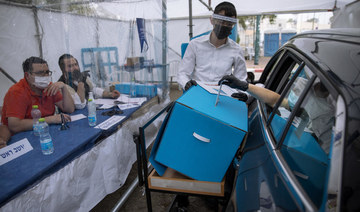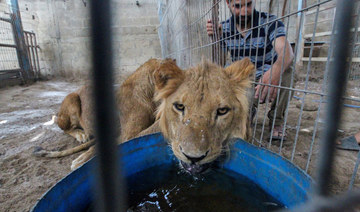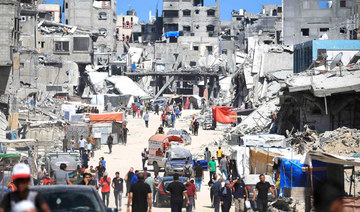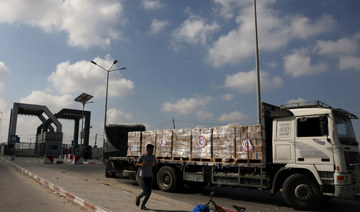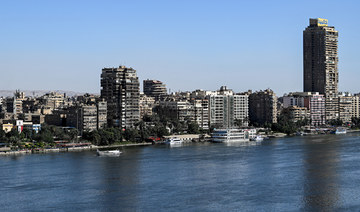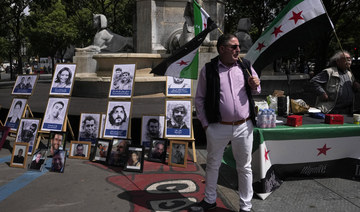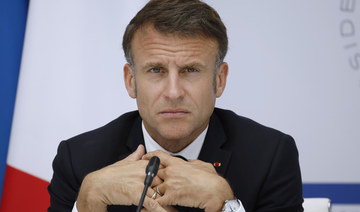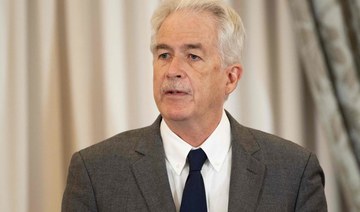JERUSALEM: Israeli parliamentary elections on Tuesday resulted in a virtual deadlock for a fourth time in the past two years, exit polls indicated, leaving Prime Minister Benjamin Netanyahu with an uncertain future and the country facing the prospect of continued political gridlock.
The exit polls on Israel’s three main TV stations indicated that both Netanyahu and his religious and nationalist allies, along with a group of anti-Netanyahu parties, both fell short of the parliamentary majority required to form a new government. That raised the possibility of an unprecedented fifth consecutive election later this year.
The election was seen as a referendum on Netanyahu’s polarizing leadership style, and the initial results showed that the country remains as deeply divided as ever, with an array of small sectarian parties dominating the parliament.
The results also signaled a continuing shift of the Israeli electorate toward the right wing, which supports West Bank settlements and opposes concessions in peace talks with the Palestinians. That trend was highlighted by the strong showing of an ultranationalist anti-Arab religious party.
After three previous inconclusive elections, Netanyahu had been hoping for a decisive victory that would allow him to form a government with his traditional ultra-Orthodox and hard-line nationalist allies and seek immunity from corruption charges.
In an address to supporters early Wednesday, a subdued Netanyahu boasted of a “great achievement” but stopped short of declaring victory. Instead, he appeared to reach out to his opponents and called for formation of a “stable government” that would avoid another election.
“We must not under any circumstances drag the state of Israel to new elections, to a fifth election,” he said. “We must form a stable government now.”
By early Wednesday, updated exit polls on two channels were forecasting an evenly divided parliament. The third station gave Netanyahu’s opponents a one-seat advantage.
Exit polls have often been imprecise in the past, meaning the final results, expected in the coming days, could still shift the balance of power. If the final results are in line with the exit polls, there is no guarantee that Netanyahu or his opponents will succeed in putting together a coalition.
“All three options are on the table: a Netanyahu-led government, a change coalition that will leave Netanyahu in the opposition, and an interim government leading to a fifth election,” said Yohanan Plesner, president of the Israel Democracy Institute.
Several right-wing parties have vowed never to sit in a government with Netanyahu. And Naftali Bennett, a former Netanyahu ally turned harsh critic, refused to endorse either side during the campaign.
Bennett shares Netanyahu’s hard-line nationalist ideology and would seem to be more likely to ultimately join the prime minister. But Bennett has not ruled out joining forces with Netanyahu’s opponents.
In a speech to his supporters, Bennett declined to take sides. He vowed to promote right-wing values but also took several veiled swipes at the prime minister’s leadership style.
“Now is the time for healing,” he said. “The norms of the past will no longer be acceptable.” He said he would move the country “from leadership that is interested in itself to a professional leadership that cares.”
Bennett has indicated he will drive a hard bargain with Netanyahu, demanding senior Cabinet ministries and perhaps even a power-sharing arrangement that includes a stint as prime minister.
In addition, their partners would also include a pair of ultra-Orthodox religious parties and the “Religious Zionists,” a party whose leaders are openly racist and homophobic. One of its leaders, Itamir Ben-Gvir, is a disciple of the late Rabbi Meir Kahane, whose Kach party was branded a terrorist group by the US for its anti-Arab racism before Kahane was assassinated in New York in 1990.
Relying on the party could be deeply embarrassing for Netanyahu on the international stage, particularly as he tries to court the new Biden administration.
The election campaign was largely devoid of substance and was seen instead as a referendum on Netanyahu’s divisive rule.
During the campaign, Netanyahu emphasized Israel’s highly successful coronavirus vaccination campaign. He moved aggressively to secure enough vaccines for Israel’s 9.3 million people, and in three months the country has inoculated some 80% of its adult population. That has enabled the government to open restaurants, stores and the airport just in time for election day.
He also tried to portray himself as a global statesman, pointing to the four diplomatic accords he reached with Arab countries last year. Those agreements were brokered by his close ally, then-President Donald Trump.
Netanyahu’s opponents say the prime minister bungled many other aspects of the pandemic, particularly by allowing his ultra-Orthodox allies to ignore lockdown rules and fuel a high infection rate for much of the year.
Over 6,000 Israelis have died from COVID-19, and the economy continues to struggle with double-digit unemployment.
They also point to Netanyahu’s corruption trial, saying someone who is under indictment for serious crimes is not fit to lead the country. Netanyahu has been charged with fraud, breach of trust and accepting bribes in a series of scandals that he dismisses as a witch hunt by a hostile media and legal system.
Even Netanyahu’s reputation as a statesman has suffered in recent days. The United Arab Emirates, the most important of the four Arab nations to establish official diplomatic ties with Israel, last week made clear that it did not want to be used as part of Netanyahu’s re-election bid after he was forced to call off a visit to the country. The Biden administration also has kept its distance, a contrast to the support he received in past elections from Trump.
Netanyahu’s Likud party was projected to emerge as the largest individual party, with just over 30 seats in the 120-seat parliament, followed by the centrist opposition party Yesh Atid, with some 17 seats.
The remainder of the parliament would be divided between some 10 other small parties. These range from an Arab party to left-wing secular parties to a pair of secular, right-wing parties that oppose Netanyahu.
Altogether, Netanyahu and his allies were projected to control 53 to 54 seats, while his opponents are expected to control some 60 or 61, with Bennett controlling the remainder.
Netanyahu’s opponents included a diverse array of parties that had little in common beyond their shared animosity toward him. Even if his opponents end up controlling a majority of seats, it will be difficult for them to bridge their ideological differences on such lightning rod issues as Palestinian statehood and the role of religion in the country.
They also were hurt by the disintegration of the main Arab party in parliament. A renegade member ran separately but appeared not to win enough seats to enter parliament, robbing the alliance of key votes.
Tuesday’s election was sparked by the disintegration of an emergency government formed last May between Netanyahu and his chief rival at the time. The alliance was plagued by infighting, and elections were forced after they failed to agree on a budget in December.
Netanyahu’s opponents have accused him of fomenting deadlock in hopes of bringing about a friendlier parliament that will grant him immunity from prosecution.
After the results come in, attention will turn to the country’s figurehead president, Reuven Rivlin.
He will hold a series of meetings with party leaders and then choose the one he believes has the best chance of forming a government as his prime minister-designate. That could set off weeks of horse-trading.
Voting in Jerusalem on Tuesday, Rivlin said the deadlock has had a price.
“Four elections in two years erode public trust in the democratic process,” he said, even as he urged Israelis to vote again. “There is no other way.”
No clear winner in Israeli election, signaling more deadlock
https://arab.news/z8pkv
No clear winner in Israeli election, signaling more deadlock
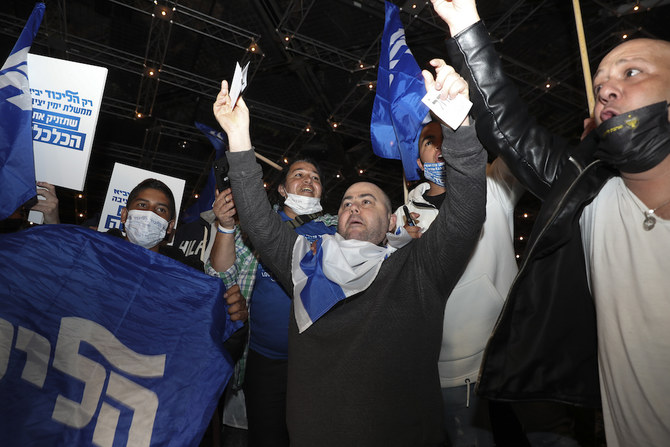
- Netanyahu's political survival appeared to rest with Naftali Bennett, leader of the far-right Yamina party
- Long-serving prime minister campaigned on success of vaccination drive
Egyptian sports critic to sue authorities in Israel after Shin Bet confuses him with Hamas member

- Media expert Hassan Makawi says simple Internet search would have uncovered ‘appalling mistake’
- He says fiasco shows Israeli media reports ‘must be scrutinized closely’
CAIRO: Egyptian sports critic Mohamed Shabana plans to sue authorities in Israel for defamation after Israeli security agency Shin Bet published his photograph by mistake instead of an image of a Hamas leader in Rafah who it believed had been killed.
Shabana said he would demand substantial compensation for the damage inflicted on him, his family, and his audience in the Egyptian media.
He also said his political career was being damaged following the incident.
He said he would donate the compensation to the “Palestinian cause — a cause we all fight for.”
Shin Bet sparked controversy on social media after posting a picture of Shabana, claiming that he was a Hamas leader killed in Rafah.
Local Israeli media initially reported the assassination of Mohammed Shabana in Rafah, a leader of the Rafah brigade of the Al-Qassam Brigades, using an image of the Egyptian media personality.
However, the Israeli media immediately corrected the error, acknowledging the failure of the assassination attempt, as reported by Yedioth Ahronoth.
The blunder sparked an initial social media uproar, with the Egyptian sports audience recognizing Shabana, making a mockery of the incident.
The fiasco also raised doubts about the capabilities of Shin Bet, which not only posted the incorrect image of a Hamas leader but also failed in the assassination attempt.
Shabana told Arab News that he came across a photo of himself trending on social media, accompanied by sarcastic comments about the Israeli army.
He said: “I did not understand what was happening and began reading to grasp what had occurred.”
Shabana said some friends and family also contacted him over the phone to express their disbelief.
He added: “They joked that the Israeli security service had assassinated me, which made me laugh too. But it did not take long before I realized how ignorant and backward the Israeli security agencies were, fabricating events, which makes me doubt everything they say.
“I know that Shin Bet is one of the strongest security agencies in Israel, and it’s unnatural for them to make such a mistake.
“But I think the chaos in the Israeli state made them fabricate or even mishandle the accuracy of their publications.
“Perhaps they Googled the name Mohammed Shabana, the leader in Hamas, and my photo popped up, so they published it, which is quite ridiculous.”
Media expert Hassan Makawi said: “What happened is a major blunder for the Israeli security forces. But the bigger blunder, in my opinion, is that of the Israeli media, which followed its agency without verifying the facts.”
Makawi said a simple Internet search would have “uncovered their appalling mistake.”
Makawi told Arab News: “It’s clear that Israel is not as strong as they claim, nor is their media as reliable as it describes itself.
“Therefore, we must scrutinize their statements and publications as they may contain many lies.”
Heavy seas batter US Gaza maritime aid mission, CENTCOM says
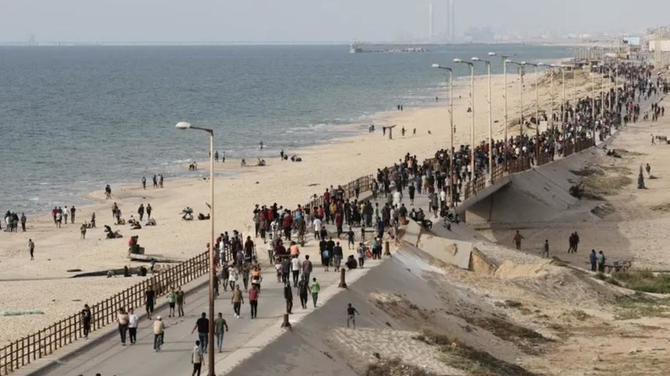
- No injuries were reported and the aid pier remains fully functional
TAMPA: Heavy seas battered the US maritime humanitarian mission to Gaza on Saturday, US Central Command (CENTCOM) said, with four vessels serving a floating aid delivery pier breaking free from their moorings.
No injuries were reported and the aid pier remains fully functional, CENTCOM said in a statement, adding that no US personnel would enter Gaza.
Two of the affected vessels were now anchored on the beach near the pier and the other two were beached on the coast of Israel near Ashkelon, CENTCOM said, adding that efforts to recover the vessels were under way with assistance from the Israeli Navy.
Rising cost of medicine in Egypt poses risk to ‘thousands of pharmacies’

- That review followed pharmaceutical companies’ request for price increases for various medications
- The EDA’s “decisions over (recent) years to raise the prices of certain types of medicine have resulted in the closure of about 1,500 pharmacies,” said Dr. Hatem El-Badawi
CAIRO: Pharmacy owners in Egypt have voiced concerns about the rising cost of pharmaceuticals in the country as they prepare for another price increase following the Egyptian Drug Authority’s recent review.
That review followed pharmaceutical companies’ request for price increases for various medications to “offset the rising costs of production, which have been exacerbated by the devaluation of the Egyptian pound against the dollar.”
The EDA’s “decisions over (recent) years to raise the prices of certain types of medicine have resulted in the closure of about 1,500 pharmacies,” said Dr. Hatem El-Badawi, secretary-general of the Pharmacy Division at the Federation of Egyptian Chambers of Commerce, adding that the “uncontrolled” rise in medicine prices has not been matched by a corresponding increase in profit margins for pharmacists.
“We anticipate more closures in 2024,” he added. “In February, the General Federation of Egyptian Chambers of Commerce appealed to the Central Bank governor to reactivate the low-interest rate loan of 5 percent for small and medium-sized pharmacies, capped at EGP500,000 ($10,600) per pharmacy.
“The goal was to safeguard pharmacies from economic challenges such as low purchasing power, cash payment demands from pharmaceutical companies, limited liquidity, rising operating costs, and shrinking profit margins.”
That proposal was rejected, however, and loans are currently only available at a 15-percent interest rate, which is, El-Badawi said, “far higher than a pharmacist’s profit margins and thus constitutes a loss.”
Pharmacy owner Dr. Sami Saad told Arab News: “We face several problems due to price increases, including reduced profit margins for pharmacists, dual pricing for drugs, and pharmaceutical companies not recalling expired products. All these issues could force us to close at any time because we are not making any profit.”
Saad added the Egyptian Drug Authority had not considered pharmacists’ demands or the crises they are facing.
“Every day is a struggle. And although I heard that the head of the authority plans to intervene to resolve these issues, there has been no progress so far,” he said.
Dr. El-Badawi reiterated: “I fear for the closure of pharmacies — a difficult situation that will only get worse. I am concerned for the 85,000 pharmacies across the country.
“The health of Egyptians is at risk,” he added. “I urge all responsible authorities to intervene.”
More than one in four Syrians ‘extremely poor’: World Bank
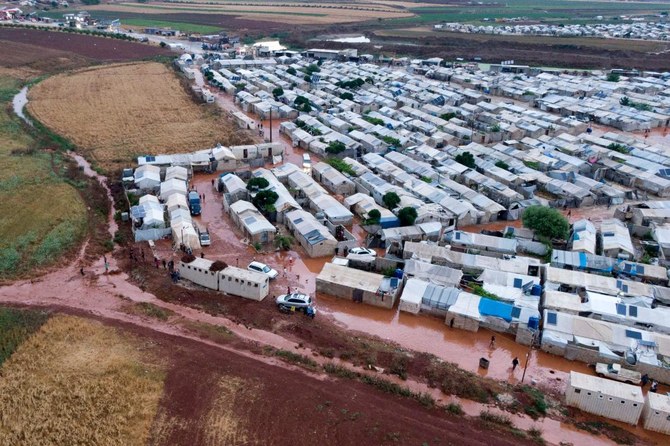
- 27 percent of Syrians — about 5.7 million individuals — live in extreme poverty
- “Continued funding shortfalls and limited access to humanitarian assistance” have further strained poor Syrians, the World Bank said
BEIRUT: More than a quarter of Syrians live in extreme poverty, the World Bank said Saturday, 13 years into a devastating civil war that has battered the economy and impoverished millions.
The World Bank published two new reports on Syria, which found that “27 percent of Syrians — about 5.7 million individuals — live in extreme poverty.”
“Extreme poverty, while virtually non-existent before the conflict, affected more than one in four Syrians in 2022” and might have further deteriorated after a deadly earthquake last year, one of the reports said.
The quake killed about 6,000 people in the country.
According to the United Nations, about 90 percent of Syrians live in poverty, while it previously estimated that around 2 million lived in extreme poverty after more than a decade of war.
The report cited neighbor Lebanon’s economic meltdown in late 2019, the Covid-19 pandemic and the war in Ukraine, as having eroded the welfare of Syrian households in recent years.
The civil war in Syria has also ravaged the economy, infrastructure and industry, while Western sanctions have added to the country’s woes.
“Continued funding shortfalls and limited access to humanitarian assistance” have further strained poor Syrians, already coping with “soaring prices, reduced access to essential services and rising unemployment,” the World Bank said.
The UN told AFP previously that its humanitarian response plan for Syria for 2024 requires more than $4 billion but that it is only six percent funded.
The international community is set to meet in Brussels Monday to try and muster funds for Syria at a yearly pledging conference.
A lack of opportunities and dwindling aid has pushed many Syrians to rely on money sent from relatives abroad to survive, with the World Bank estimating that “in 2022, the total value of remittances received by Syrian households reached about $1.05 billion.”
Syria’s estimated GDP stood at around $6.2 billion in 2023.
Syria’s “real GDP is projected to contract by 1.5 percent in 2024, extending the 1.2 percent decline in 2023,” the report said.
“Inflation is anticipated to remain high in 2024 due to the pass-through effects of currency depreciation, along with persistent shortages and potential further subsidy cuts (for) food and fuel,” it said.
Syria’s war has killed more than half a million people and displaced millions more since it erupted in 2011 after Damascus cracked down on anti-government protests.
Israel official says ‘intention’ to renew Gaza talks ‘this week’
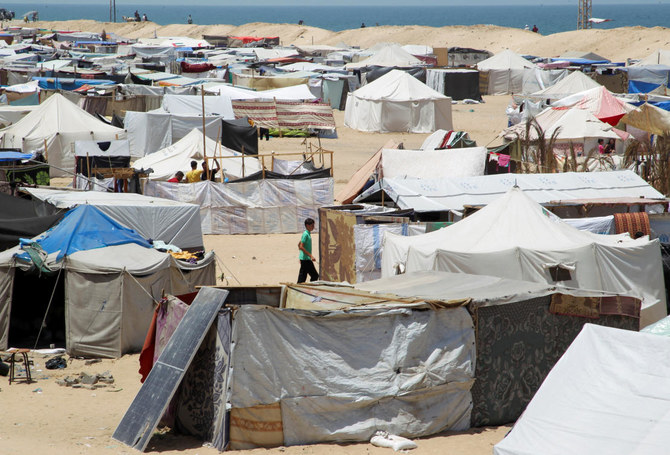
- “There is an intention to renew the talks this week and there is an agreement,” said the official
- The official did not elaborate on the agreement
JERUSALEM: An Israeli official said Saturday the government had an “intention” to renew “this week” talks aimed at reaching a hostage release deal in Gaza, after a meeting in Paris between US and Israeli officials.
“There is an intention to renew the talks this week and there is an agreement,” the official told AFP on condition of anonymity.
The Israeli official did not elaborate on the agreement, but Israeli media reported that Mossad chief David Barnea had agreed during meetings in Paris with mediators CIA Director Bill Burns and Qatari Prime Minister Mohammed bin Abdulrahman Al-Thani on a new framework for the stalled negotiations.
Top US diplomat Antony Blinken also spoke with Israeli war cabinet minister Benny Gantz about new efforts to achieve a ceasefire and reopen the Rafah border crossing, Washington said.
Talks aimed at reaching a hostage release and truce deal in the Gaza Strip ground to a halt this month after Israel launched a military operation in the territory’s far-southern city of Rafah.
The Gaza war broke out after Hamas’s October 7 attack resulted in the deaths of more than 1,170 people, mostly civilians, according to an AFP tally based on Israeli official figures.
Militants also took 252 hostages, 121 of whom remain in Gaza, including 37 the army says are dead.
Israel’s retaliatory offensive has killed at least 35,903 people in Gaza, mostly women and children, according to data from the Hamas-run territory’s health ministry.



